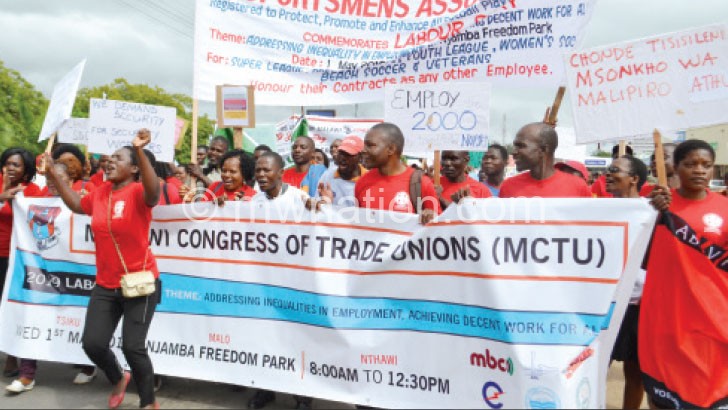Employees’ woes
Stem corruption among labour officers, fill the vacant positions of chairperson and deputy at the Industrial Relations Court (IRC) and sensitise employees on labour laws, or brace for more abuses and escalation of labour disputes at the court.
IRC registrar for Blantyre Registry Innocent Nebi confirmed that there were a staggering 9 104 unresolved cases countrywide, saying Blantyre Registry alone has 4 038 cases and registers between 80 and 90 cases every day.
In separate interviews, unionists and industrial labour relations experts have further warned that despite the country boasting of having one of the best labour laws in the region, employers will continue to dupe their employees of their pensions, gratuity and severance pay, among other benefits, through suspicious computation once they leave employment.
Employers Consultative Association of Malawi (Ecam) executive director George Khaki observed in an interview the long absence of the chairperson and deputy chairperson at the IRC is contributing to delays in disposing of cases.

awareness of labour laws
“For instance, the Principal Registry in Blantyre has had no chairperson as well as deputy chairperson for several months and that means cases are not being heard and employers take advantage of that,” he said.
Khaki also cited “some unscrupulous employers” who he said are either genuinely ignorant of the labour laws or they deliberately disregard them while workers’ lack of knowledge about the laws was also giving room to the increased labour disputes.
IRC has been without the two since April 2020 when former president Peter Mutharika appointed the chairperson Chimwemwe Kamowa as a High Court judge while his successor President Lazarus Chakwera did the same to deputy chairperson Anneline Kanthambi in October the same year.
Malawi Congress of Trade Union secretary general Denis Kalekeni while agreeing with Khaki observed that lack of funding to the Ministry of Labour was also compounding the challenges as it was not able to conduct regular inspections in workplaces.
“So we have armchair officers that are not doing their job to ensure employers abide by the law. Additionally, much as others are striving to enforce the law, some officers are cobwebbed in deep corrupt practices.
“They go and meet some unscrupulous employers who hand out huge sums of money to them to conceal serious labour-related issues thus defeating the law and regularly these issues emerge when disgruntled workers take the matter to court,” he observed.
Kalekeni said enforcement of the labour laws was the main challenge which enables employers to take advantage of and start abusing the law and the workers.
Concurring with Kalekeni, chairperson of the Human Rights Consultative Committee (HRCC), Robert Mkwezalamba, also lamented the failure by Ministry of Labour to conduct regular labour inspections and ensure they are in line with labour laws.
“This failure has led to high levels of corruption where labour officers do not even conduct these inspections but produce reports for institutions they have not inspected. Because of this sad development, we have seen employers who even challenge workers to go anywhere and complain,” he alleged.
Mkwezalamba also bemoaned the low penetration of trade unions which currently stands between nine and 13 percent of the country’s total workforce that includes formal jobs amounting to around 800 000 and informal jobs which hover around seven million.
“So the employer would capitalise on the workers’ ignorance and do what he wants when calculating an employee’s benefits,” he said.
University of Malawi‘s Chancellor College conflict resolution specialist Master Dicks Mfune concurred with Mkwezalamba, saying most employers have no knowledge of handling employees’ issues.
“Again most workers do not know how to handle issues and don’t know labour laws and that is why they are sometimes sent back by IRC,” he said.
But Deputy Minister of Labour Vera Kamtukule in an e-mail response faulted trade unions in the country for failing to conduct workers’ education so that employers are knowledgeable about their labour rights and empowered accordingly.
“Unfortunately, our trade unions have been able to organise few workers, mainly due to capacity challenges that include human, financial and governance,” she said.
Kamtukule also said the problem is due to low trade union coverage, with less than 15 percent of workers in the country unionised.
“The other one is limited knowledge of the law and low capacity of employees to demand their rights due to absence of trade unions in most enterprises.”
She explained that Malawi has a very conducive legal and policy framework for the operation of trade unions in the country, saying among other things, the Act provides for access to the employer’s premises by trade union leaders for the purpose of organising employees.
Regarding the alleged corruption and completion of inspection reports without actually conducting the inspections, that is news to this Ministry’s authorities – we are hearing about this for the first time.
“Nevertheless, we will institute investigates in order to establish the truth (or lack of it) of the allegations.”
Last year, Malawi Human Rights Commission launched a labour justice audit after it received 92 labour-related complaints especially against foreign companies and investors in addition to cases that are registered at the IRC and labour offices.
The Reserve Bank of Malawi in its latest figures also indicated that companies and organisations were yet to remit over K27 billion in pension arrears to pension fund managers, a development that does not only put in jeopardy employees’ contributions but intensify labour disputes.
Judiciary spokesperson Gladys Gondwe did not respond to our questionnaire on IRC.





